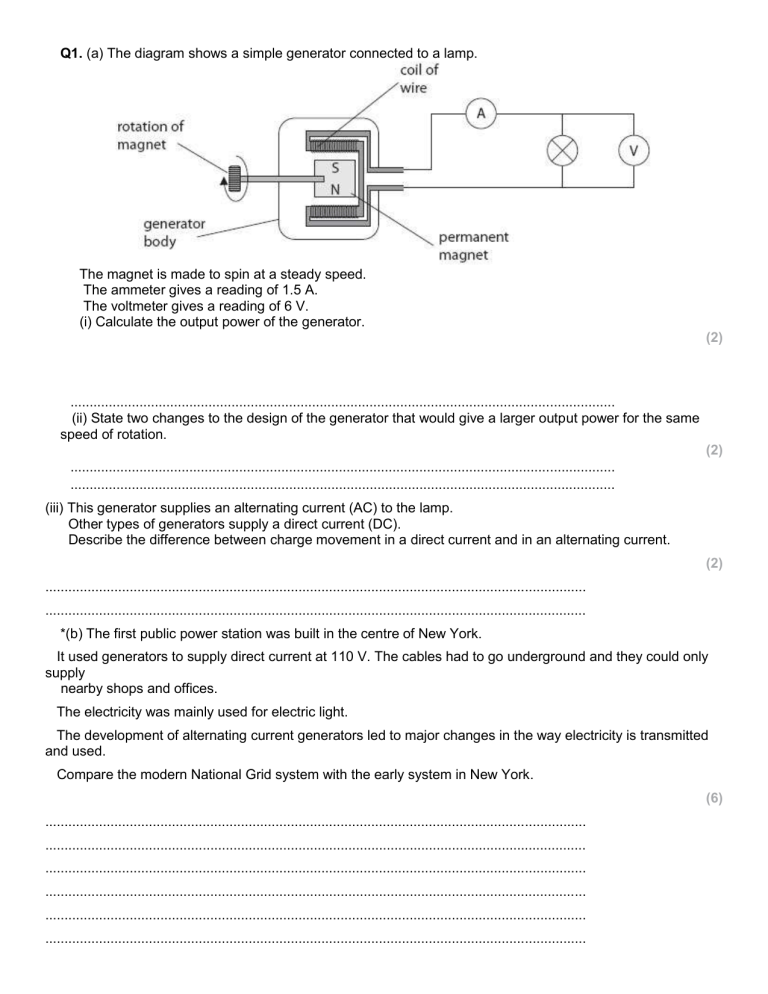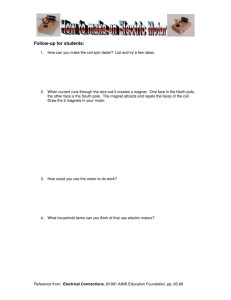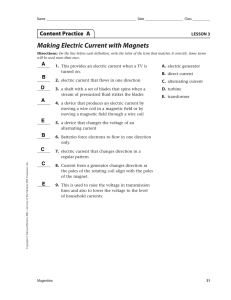
Q1. (a) The diagram shows a simple generator connected to a lamp. The magnet is made to spin at a steady speed. The ammeter gives a reading of 1.5 A. The voltmeter gives a reading of 6 V. (i) Calculate the output power of the generator. (2) .............................................................................................................................................. (ii) State two changes to the design of the generator that would give a larger output power for the same speed of rotation. (2) .............................................................................................................................................. .............................................................................................................................................. (iii) This generator supplies an alternating current (AC) to the lamp. Other types of generators supply a direct current (DC). Describe the difference between charge movement in a direct current and in an alternating current. (2) ............................................................................................................................................. ............................................................................................................................................. *(b) The first public power station was built in the centre of New York. It used generators to supply direct current at 110 V. The cables had to go underground and they could only supply nearby shops and offices. The electricity was mainly used for electric light. The development of alternating current generators led to major changes in the way electricity is transmitted and used. Compare the modern National Grid system with the early system in New York. (6) ............................................................................................................................................. ............................................................................................................................................. ............................................................................................................................................. ............................................................................................................................................. ............................................................................................................................................. ............................................................................................................................................. ............................................................................................................................................. ............................................................................................................................................. ............................................................................................................................................. ............................................................................................................................................. ............................................................................................................................................. ............................................................................................................................................. ............................................................................................................................................. (Total for Question is 12 marks) Q2. Figure 13 (a) Figure 13 represents a transformer. Calculate the number of turns in the secondary coil. Use an equation selected from the list of equations at the end of this paper. (2) number of turns ........................................................... (b) Opening the switch in a circuit produces the opposite magnetic effect to closing the switch. A scientist connected a switch, a fixed resistor and a battery to the primary coil of a step-up transformer. The scientist also connected a fixed resistor across the secondary coil. The scientist switched the circuit on and then later switched it off. Which of these best represents the current in the secondary coil? (1) (Total for Question is 3 marks) Q3. A teacher is demonstrating electromagnetic induction. The teacher has a bar magnet, a coil of wire and a sensitive voltmeter. (i) Draw a diagram to show how the teacher should arrange the apparatus. (1) (ii) Explain how the teacher could use this apparatus to demonstrate the factors affecting the size and direction of the induced potential difference. (4) ............................................................................................................................................. ............................................................................................................................................. ............................................................................................................................................. ............................................................................................................................................. ............................................................................................................................................. ............................................................................................................................................. ............................................................................................................................................. ............................................................................................................................................. (Total for question = 5 marks) Q1. Answer (ai) Substitution (1) 1.5 × 6 Evaluation (1) 9 (W) Ignore any unit given by candidate. (aii) More turns on the coil (1) More powerful/stronger magnet(s) (1) (aiii) QWC A description including in one direction only for DC (1) reversing direction for AC (1) *(b) Acceptable answers Power of 10 error max 1 mark Give full marks for correct answer with no working shown Wrap coils on iron (core/former)/ more coils/twists/loops. Bigger coil is insufficient. More magnets. Bigger/larger magnet is insufficient. Ignore increase speed of rotation 'DC goes straight' is insufficient AC switches/changes direction OR moves to and fro 'AC goes different ways' is insufficient. Diagram with labelled arrows could get 2 marks. Mark (2) (2) (2) Indicative Content Mark A comparison including some of the following ideas Transformers can be used or voltages/currents can be changed/transformed AC (can transmit) at lower current/high(er) voltage National Grid is (usually) over ground (DC cables (were) underground) Less energy lost in transmission National Grid system can supply to customers further away Possible to create a grid linking power stations More flexibility in voltage for consumer Consumer can draw large(r) current More flexibility in power drawn Great(er) range of (6) Exp Level 1 0 1-2 devices can be powered Ignore methods of electricity production No rewardable content a limited (maybe implied) comparison giving one fact e.g: AC can be at high(er) voltage OR the National Grid can supply houses not close to a power station/ further (away/than the New York system.) the answer communicates ideas using simple language and uses limited scientific terminology spelling, punctuation and grammar are used with limited accuracy 2 3-4 a simple comparison including two ideas which may be linked or not eg Nat. Grid can supply whole country and can be used for more appliances (than just lighting). e.g: AC can be transmitted further (than DC) (because it) wastes less energy the answer communicates ideas showing some evidence of clarity and organisation and uses scientific terminology appropriately spelling, punctuation and grammar are used with some accuracy 3 5-6 A detailed comparison including at least three ideas, with at least one direct link between two of them. e.g. AC can be transmitted further (than DC) because AC can be transformed to lower current/high(er) voltages. OR AC can be transformed to lower current/high(er) voltages. Greater range of devices used. the answer communicates ideas clearly and coherently uses a range of scientific terminology accurately spelling, punctuation and grammar are used with few errors Total for Question = 12 mark Q2.a b Q3.

